Homo habilis - Study guides, Class notes & Summaries
Looking for the best study guides, study notes and summaries about Homo habilis? On this page you'll find 115 study documents about Homo habilis.
Page 3 out of 115 results
Sort by

-
ANTHROPOLOGY EXAM 3 WVU QUESTIONS WITH VERIFIED SOLUTIONS.
- Exam (elaborations) • 9 pages • 2024
-
- $11.49
- + learn more
ANTHROPOLOGY EXAM 3 WVU QUESTIONS WITH VERIFIED SOLUTIONS. What makes us human? - answerBipedalism, brains, skulls, Childhood dependency, tools, teeth biopedalism - answerstresses the advantages it provided in a habitat increasingly dominated by dry, savanna-like conditions. Brains and skulls - answerEarly hominins had very small brains, Brain size has increased during hominin evolution, especially with the advent of the genus Homo. Childhood dependency - answerCompared with the young o...
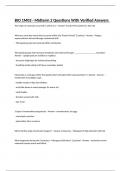
-
BIO 1M03 - Midterm 2 Questions With Verified Answers
- Exam (elaborations) • 25 pages • 2024
-
- $12.99
- + learn more
The origin of mammals occurred in which era? - Answer Triassic Period (252 Ma- 201 Ma) What are some key events that occurred within the Triassic Period? (2 points) - Answer - Pangea supercontinent formed through continental drift. - Therapsida groups had evolved within vertebrates Therapsida groups had increased metabolic rate inferred through: ___________________ (3 points) - Answer - upright posture (relative to reptiles) - muscular diaphragm for enhanced breathing - breathing while ...

-
SDSU Anthropology 101 InQuizitive Chapter 11 2023/2024
- Exam (elaborations) • 7 pages • 2024
- Available in package deal
-
- $12.99
- + learn more
SDSU Anthropology 101 InQuizitive Chapter 11Important changes in the landscape of East Africa and South Africa may have been associated with the rise of Homo habilis and the eventual extinction of the australopithecines. Which of the following statements describe this transition? - correct answer -Underground plant parts (edible roots, etc.) became more important, which increased selection for the use of tools. -Habitat changes correlated with changes in cranial and tooth morphology in Homo h...

-
HUMAN EVOLUTION QUESTIONS AND ANSWERS RATED A
- Exam (elaborations) • 8 pages • 2023
- Available in package deal
-
- $9.99
- + learn more
HUMAN EVOLUTION QUESTIONS AND ANSWERS RATED A A new fossil is found, and scientists are debating whether it can be considered a part of the human genus Homo. What piece of evidence would best indicate that the fossil is human? large jaw bone for muscle attachment pelvic blades rotated inward very long arms thick rib cage pelvic blades rotated inward An anthropologist finds a fossil that is 4 million years old. Its pelvis suggests it walked upright. Which species could the specimen belong to...
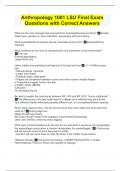
-
Anthropology 1001 LSU Final Exam Questions with Correct Answers
- Exam (elaborations) • 9 pages • 2024
- Available in package deal
-
- $9.49
- + learn more
What are the main changes that occurred from australopithecines to Homo? Smaller, flatter face; reduction in size of dentition; scavenging and tool making What australopithecine species did we most likely evolve from? Australopithicus robustus What evidence do we have for reorganization and expansion of the human brain? Tool use Enamel degradation Larger Brain size Homo habilis characteristics and features of its hand and foot • 2-1.4 Million years ago • Olduvai Gorge, Tanzania • Larger...
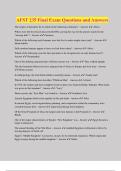
-
AFST 235 Final Exam Questions and Answers
- Exam (elaborations) • 6 pages • 2024
- Available in package deal
-
- $11.49
- + learn more
AFST 235 Final Exam Questions and Answers The origins of humanity lie in which of the following continents? - Answer ️️ -Africa Where were the first fossils discovered(1856)- paving the way for the greater search for the "missing link"? - Answer ️️ -Germany Which of the following early humans were the first to make simple stone tools? - Answer ️️ - Homo habilis Fully modern humans appear to have evolved from where? - Answer ️️ -Africa Which of the following were the firs...
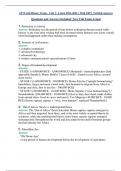
-
AP World History Exam - Unit 1 ( Latest 2023-2024 ) With 100% Verified Answers Questions and Answers Included | New Full Exam Actual
- Exam (elaborations) • 22 pages • 2023
- Available in package deal
-
- $8.99
- + learn more
AP World History Exam - Unit 1 ( Latest ) With 100% Verified Answers Questions and Answers Included | New Full Exam Actual 1. Prehistory ry Answer: Prehistory wasthe period of time before writing had beeninvented while history is any time after writing had been invented where humans now know exactly what had happened rather than making assumptions 2. Features of civilization: Answer 1: complex institutions 2: advanced technology 3: advanced city 4: written communication5:specializa...
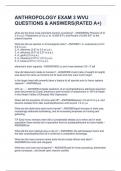
-
ANTHROPOLOGY EXAM 3 WVU QUESTIONS & ANSWERS(RATED A+)
- Exam (elaborations) • 7 pages • 2024
- Available in package deal
-
- $11.99
- + learn more
what are the three most important hominin evolutions? - ANSWERthe Pliocene (5 to 2 m.y.a.), Pleistocene (2 m.y.a. to 10,000 B.P.) and Recent (10,000 B.P. to the present) epochs What are the six species in chronological order? - ANSWER1. A. anamensis (4.2 to 3.9 m.y.a.). 2. A. afarensis (3.8? to 3.0 m.y.a.). 3. A. africanus (3.0? to 2.0? m.y.a.). 4. A. garhi (2.5 m.y.a.) 5. A. robustus (2.0? to 1.0? m.y.a.). 6. A. boisei (2.6? to 1.0 m.y.a.). afarensis's brain capacity - ANSWER450 cc ...

-
Anthropology Final-ANT 100 Lacquament Exam Questions and Answers 100% Pass
- Exam (elaborations) • 14 pages • 2024
- Available in package deal
-
- $12.49
- + learn more
Anthropology Final-ANT 100 Lacquament Exam Questions and Answers 100% Pass _ consists of traditions and customs, transmitted through learning, that form and guide the beliefs and behavior of a group of people. - Answer- Culture Cultural Anthropology - Answer- Study of human society and culture Archaeology - Answer- Study of human behavior through material remains Biological Anthropology - Answer- Study of human biological variation through time and as it exists today linguistics - Answer...

-
Anthropology 101 Kerr Final with 100% correct answers
- Exam (elaborations) • 8 pages • 2024
- Available in package deal
-
- $14.99
- + learn more
Anthropology 101 Kerr FinalFalse - correct answer Neanderthal remains have never been found outside of Africa True - correct answer Homo Habilis is credited with the first stone tools, known as Oldowan False - correct answer Homo Habilis remains are found in Asia, Africa, Java, and India True - correct answer Homo erectus was first known as Pithecanthropus erectus True - correct answer Some Neanderthals had brains that were larger than ours today True - correct answer Obsidian too...

How did he do that? By selling his study resources on Stuvia. Try it yourself! Discover all about earning on Stuvia


